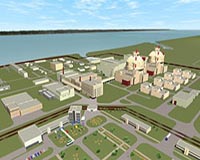 |
Tokyo (UPI) Mar 3, 2009 Bolstered by a plan for low-interest loans for new nuclear reactors announced last month, Japan is forging ahead with nuclear power expansion as part of its objective to reduce emissions. According to the World Nuclear Association, nuclear energy accounts for nearly 30 percent of Japan's total electricity production, with a planned increase to 41 percent by 2017. Last fall Japanese Prime Minister Yukio Hatoyama announced the country's goal of slashing greenhouse gas emissions by 25 percent from 1990 levels by 2020. "If we want to do this 25 percent reduction, obviously we need more nuclear plants," Shunsuke Kondo, chairman of Japan's Atomic Energy Commission, said recently to The Christian Science Monitor. The Japanese government also wants to upgrade some of its existing nuclear plants to pluthermal reactors, which use a fuel commonly referred to as plutonium uranium mixed oxide fuel, or MOX fuel. It is calling for electric utilities to use MOX fuel in 16 to 18 of the country's nuclear power plants by the year 2010. A nuclear reactor at Japan's second pluthermal power generation facility, the Ikata plant operated by Shikoku Electric Power Co., was activated Monday, Kyodo News reports. MOX fuel is scheduled for insertion Thursday, with commercial operation planned for late March, after government inspections. Ikata's pluthermal plan had been delayed for about a week because of a "minor" radioactive leakage, Kyodo reports. Japan's first pluthermal plant, Kyushu Electric Power Co.'s Genkai facility, opened last November. That also faced a delay because of coverups of reactor problems at other nuclear power plants as well as opposition from local governments and residents, Kyodo reports. Chubu Electric Power Co. in Nagoya and Kansai Electric Power Co. in Osaka are planning to start pluthermal operations in April. Japan's Nuclear Safety Commission deems MOX fuel as safe in 2002 but critics say MOX increases the risk and severity of a nuclear accident. "MOX fuel is many times more dangerous than uranium fuel," Makoto Kondo, a longtime opponent of the Ikata plant told The Christian Science Monitor. "When it comes to blasts or accidents, far more devastating damage would occur with pluthermal reactors." Contrary to the government's claims that the pluthermal program would recoup precious resources and is necessary for securing Japan's energy supply, Japanese activist group Green Action maintains that the actual quantity of uranium saved would be negligible. And the cost of fabricating and shipping MOX fuel is "far greater" than uranium fuel. "The simple reason for using plutonium is because we want to use our resources as best as we can," said Kondo of Japan's Atomic Energy Commission, pointing out that MOX fuel has been used safely in Europe for years.
Share This Article With Planet Earth
Related Links Nuclear Power News - Nuclear Science, Nuclear Technology Powering The World in the 21st Century at Energy-Daily.com
 EU backs European investor for Bulgarian nuclear plant
EU backs European investor for Bulgarian nuclear plantSofia (AFP) March 2, 2010 EU Energy Commissioner Guenther Oettinger on Tuesday backed Bulgarian efforts to find a European investor for a new nuclear plant in Bulgaria that a Russian company has been hired to build. "We are very cautious about this project. We are aware of Bulgaria's existing contracts, which it should meet. "But we also have a marked interest in having European participaton in the project," Oett ... read more |
|
| The content herein, unless otherwise known to be public domain, are Copyright 1995-2010 - SpaceDaily. AFP and UPI Wire Stories are copyright Agence France-Presse and United Press International. ESA Portal Reports are copyright European Space Agency. All NASA sourced material is public domain. Additional copyrights may apply in whole or part to other bona fide parties. Advertising does not imply endorsement,agreement or approval of any opinions, statements or information provided by SpaceDaily on any Web page published or hosted by SpaceDaily. Privacy Statement |